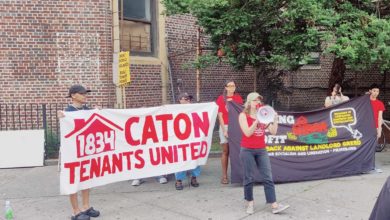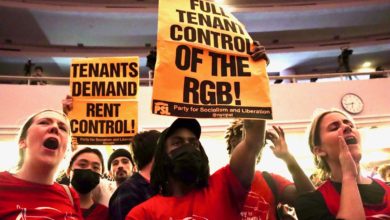Salt Lake City continues to be ranked in the top 10 most over-valued housing markets in the country as the price for housing continues to surge. The median cost of a single-family home in Utah increased by 23.6 percent in the past year, which comes after a 30.6 percent increase from 2020 to 2021.
Across the state, there have been record levels of housing shortages, with the National Low Income Housing Coalition’s 2022 report identifying a shortage of 40,981 affordable rental units in Utah.
Utah landlords are taking advantage of the dire housing shortage by rapidly raising rental prices. As of June 2021, 40% of Utah renters were paying more than 30% of their income on rent and 20% were paying more than 50% of their income on rent. But instead of holding landlords accountable, government officials sit idly by as more and more renters become rent burdened or lose their housing altogether.
In fact, some government officials in Utah are working with and taking money from private real estate and development interests. Some of these housing capitalists actually run parts of the Salt Lake City government.
City Council bans new homeless shelters
Unsurprisingly, these conditions have led to a constantly growing homeless population as more and more poor and working people are priced out of their homes. This trend has hit the elderly population in Utah particularly hard, with an 11% increase in people over 55 years old seeking homeless services between May 1, 2021, and April 15, 2022.
The currently existing homeless shelters in Salt Lake City have inadequate capacity to meet the current and growing need for beds.
Despite the growing need for shelter space, the Salt Lake City council voted unanimously to extend a moratorium on new homeless shelters until May 2023. They claim that their decision to extend the moratorium on new homeless shelters is intended to “lead to a more equitable distribution of resources throughout the city” and to pressure “other cities to ‘step up to the game.’” But the housing crisis is not a game for the masses of workers increasingly priced out of affordable housing.
As the director of a local homeless shelter explains: “Our homeless will remain in urban settings even if homeless service providers do not remain in an urban setting, or if there is a lack of homeless service providers in an urban setting.”
Local politicians tied to big business
In the city of Salt Lake, like in many U.S. cities, local government officials are often bought and paid for by real estate and development interests.
According to public records, Salt Lake City Mayor Erin Mendenhall received at least $64,600 in campaign donations from real estate interests between February 2021 and February 2022. These contributions represent 39 percent of her total donations, and 80 percent of her big dollar contributions (any contribution above $500).
Mendenhall is also married to a property developer, tying the livelihood of her family to housing development in the city.
As a local housing activist notes in a recent investigative journalist piece, “[The Mayor] is more interested in representing the business owners and the developers. Her husband is a developer. There is a Utah Story for you! Her husband owns a property just a block and a half from where the former homeless shelter was bulldozed.”
Empty promises
In April, the Salt Lake City council applauded itself for the allocation of $20 million to its Housing Trust Fund board. A closer inspection of the Housing Trust Fund board reveals how the government works hand-in-hand with the ruling capitalist class.
All eight of the city council-elected Housing Trust Fund board members have a clear conflict of interest in providing aid to the unsheltered population, or to those struggling to find affordable housing in the city. Most of them benefit from or have direct experience in maximizing profits for real estate investment projects — an endeavor that is directly at odds with decreasing the cost of housing.
Below is a list of all the current members on the board and their connections to real estate profits:
- Robert Rendon, community development director at Zion’s Bank. Banks profit from giving loans to real estate projects.
- Scott Cuthbertson, director of operations of “The Point Utah,” property developers who are moving the prison to convert land for real estate profit.
- Edward Makowski, financial advisor at Wells Fargo
- Paul Cherecwich, retired corporate tax legal counsel. His career was spent increasing the wealth of corporate interests.
- Matthew Pauly, senior associate at Gold Evans, an architecture firm.
- Marty Biljanic, senior development manager for a commercial real estate development and investment business.
- Amy Rowland, director of CDFA, a community development non-profit that helps investment agencies get tax write-offs by investing in low-income businesses.
- Shelley Bodily, architecture professor and Ballpark area resident, who has publicly complained about the homeless population in the area. She is also married to a project manager at FFKR architects.
Not one of the Housing Trust Fund board members is qualified for the job of dispersing financial aid directly to homeless resources. In short, the $20 million allotted to this board is nothing but a veiled attempt to line the pockets of property developers.
Salt Lake deserves better
The mayor’s office and city council, both run by Democrats, repeatedly vocalize their sympathy for those most impacted by the housing crisis, while their actions reveal complete apathy and an inability to provide any material support. Instead, they pour money meant for affordable housing into their Housing Trust Fund board, which is made up of elites who directly benefit from real estate profits. They claim to represent everyone who lives in Salt Lake City, yet they only represent the few who can donate the most to their campaigns.
The residents of Salt Lake City and all cities do not benefit from politicians in the pockets of real estate developers. As the numbers of people who are struggling to find affordable housing in the city rises, so does the need for a movement that can come together to raise the demand for housing for all!





